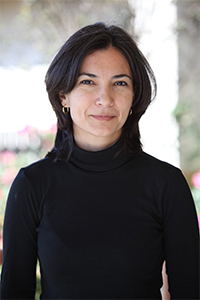Gladys Krause advocates for culturally-sensitive teaching practices for bilingual students

Language and culture greatly influence how a student thinks, learns and experiences the school context. Neglecting the importance of these issues in the classroom can have dire effects on student learning.
Over the course of her career, Gladys Krause, assistant professor of mathematics education, has been conducting research that delves into how bilingual and emerging bilingual students learn — and how mathematics teachers can best support these learners.
“Research shows that culturally and linguistically diverse students engage in mathematical practices as deeply as anyone else, possess the same brilliance as any of their monolingual and monocultural counterparts, and demonstrate enormous flexibility in their thinking,” says Krause. “Unfortunately, these characteristics can be overshadowed by deficit discourses that phrase differences from monolingual and monocultural student performance in terms of what linguistically and culturally diverse students cannot do.”
Krause’s focus on working with bilingual students and teachers lies at the heart of a new project she has embarked on with colleagues from Southern Oregon University. The project, “Empowering K-5 Teachers in Southern Oregon Through Computational Thinking,” is being funded by the National Science Foundation and aims to expose students to computer science topics while they are young.
Krause and fellow researchers will work closely with in-service teachers to integrate computational thinking into their teaching, with the overall goal of inspiring more students from diverse backgrounds to study computer science in college. The project looks to reform elementary education by incorporating computational thinking methods and computer science skills in the classroom and to influence children’s pathways into STEM careers from an early age.
Increasing the diversity of the STEM workforce confers benefits to society as a whole, says Krause. For example, recent experience with social media and data mining has suggested that algorithms designed to be impartial might actually inadvertently magnify the preconceptions — whether conscious or subconscious — held by those involved in their design.
“One potential path to mitigating the adverse effects of such biases would be to ensure that a wider range of perspectives appears in their design,” says Krause. “More generally, diversity in the STEM workforce will bring new perspectives, ideas, and solutions to STEM challenges.”
Organizing schools and preparing teachers so that all students can reach their full capacities in STEM could be transformative for individual students, argues Krause, as well as for teachers, for schools, and for society as a whole.